Does your cat meow at night and prevent you from getting any rest?
Why is s/he doing this and what can you do to prevent it?
Does your cat meow all the time? You love your cat, of course, and it’s great when they’re active and make loud noises whenever they feel like it. But if your feline friend is one of those proverbial night owls who meow loudly after bedtime, waking you up each time, you’ll probably start to ask yourself at some point whether you made the right decision to share your home with a cat. But never fear, there are ways to prevent yourself from getting those dark circles under your eyes: find out below how you can fix the situation! After that, you won’t have any more nasty surprises at night and you’ll also finally have sweet dreams again: “Good night!”
Why does my cat meow at night?
You just barely snuggled into bed and … oh, for Goodness’s sake! There it is again. That heart-rending mewing. The damage has been done! You’re wide awake. You toss and turn, you try to ignore it at first, but then the uncertainty drives you out of bed. Maybe something’s actually wrong with the little kitty? Sometimes it’s obvious what your cat is trying to tell you; indeed, with a trained cat-lover’s eye, it’s even easy to figure out what they need. Sometimes, however, you just can’t tell, so you have to get up and investigate the cause…
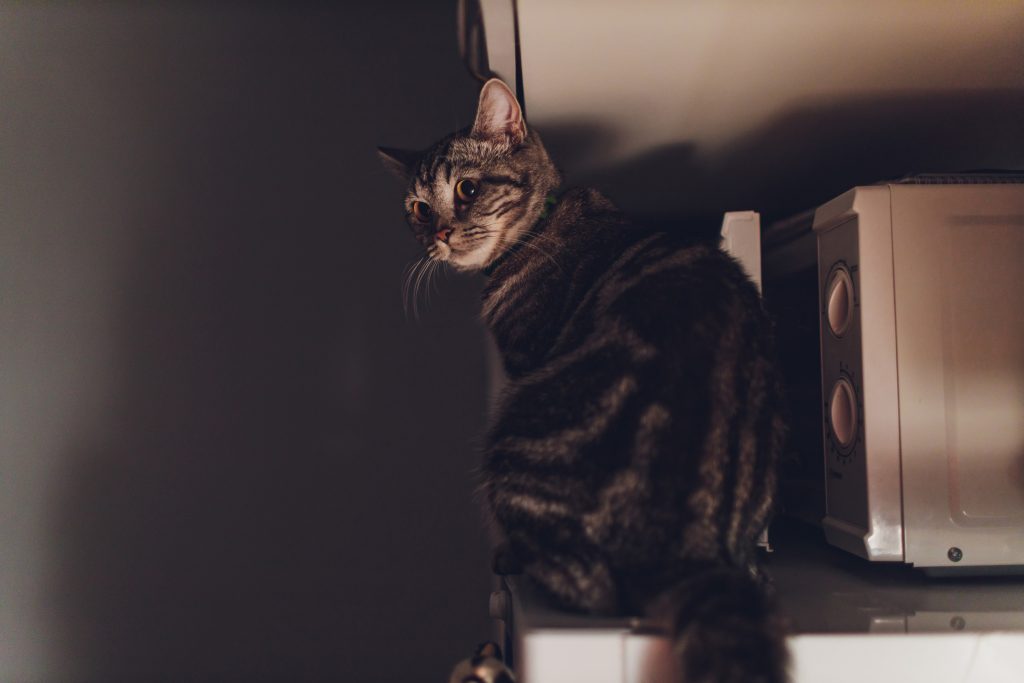
Your cat is hungry
When kittens mew, they’re calling to their mother: “hungry, thirsty, help!” An adult cat that meows is looking to you for support – something they’ll continue to do well into old age. In each case, depending on the nature of the sounds they’re making, they’re asking you to help them satisfy certain needs:
Exuberant, delighted meows: “I’m so glad you’re here!”
Loud, energetic meowing: “Feed me/ play with me!”
Whiny, pathetic meows: “I’m missing something, something hurts!”
Meowing in a whisper, very softly: “Come and cuddle!”
Your cat wants attention

Just like us humans, some cats are simply very talkative, while others prefer to not say much at all. For their human owners, however, most kitties generally have very special behaviours and sounds that are reserved for their two-legged friends. If your cat wants attention, s/he will prance around you when you’re in the room and also – of course! – meow vociferously!
Too much energy

When cats have to fend for themselves, they’re always busy hunting. After all, if they don’t catch anything, they go hungry. In contrast, feline lords and ladies who stay inside don’t have to exert themselves very much physically. Okay, they may climb up and down the cat tree or sit on the window sill and take aim at prey outside – but these cats don’t get physically exhausted by doing that. Keep your cat occupied with toys and play.
Illness or pain

It’s hard to be sure when cats are in pain, because they don’t usually moan loudly. Of course, there are injuries where you’ll immediately notice that something is wrong with your cat. But if a cat is mewing pitifully – then you can almost be certain that something’s bothering them. In that case, they’re going to need help, and they’re making these whining sounds to get you to notice.
Is your cat stressed?

Your cat is a “creature of habit” in the truest sense of the word! S/he doesn’t like change. If conditions in a cat’s environment are constantly changing, it stresses them out. This is pretty logical, seeing as cats have to be alert at all times. They’re always checking their territory for signs of danger, and they can only relax when everything’s been inspected. Otherwise, they’ll be on edge and let everybody know how they feel.
Your cat suffers from hormonal fluctuations

Mating time is seasonal in cats. When it stays light for twelve hours and their hormone levels rise, cats get in the mood for love.Normally, the “lust phase” lasts until a suitable partner is found. Male cats are even able to “sniff out” a willing female, even if she’s miles away; after that, they follow her and make loud noises to signal their intention. Especially at night, the howling can be quite nerve-wracking…

Tips to keep your furry friend quiet at night
What can you do when your cat meows at night to keep things quiet and help you sleep through till morning? Depending on the cause – we already described the factors that might prompt night-time meowing above – you can relatively quickly take measures to effectively reduce the noise level. Of course, it’s also important to find a comfortable sleeping place for your cat. You should provide them several places to sleep – cosy nesting and resting areas, preferably at different heights.
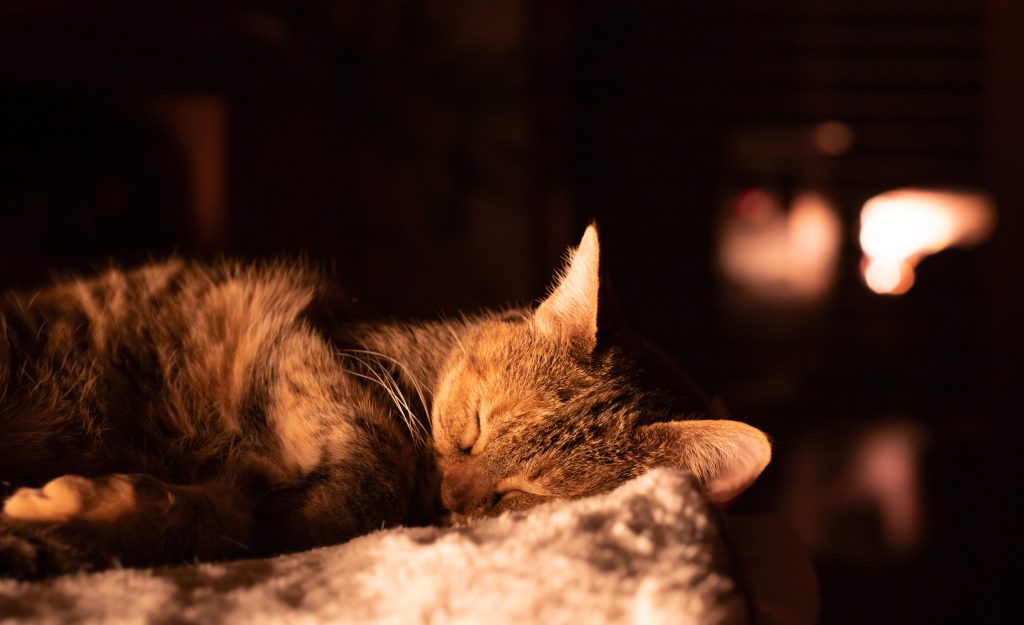
Don’t react immediately
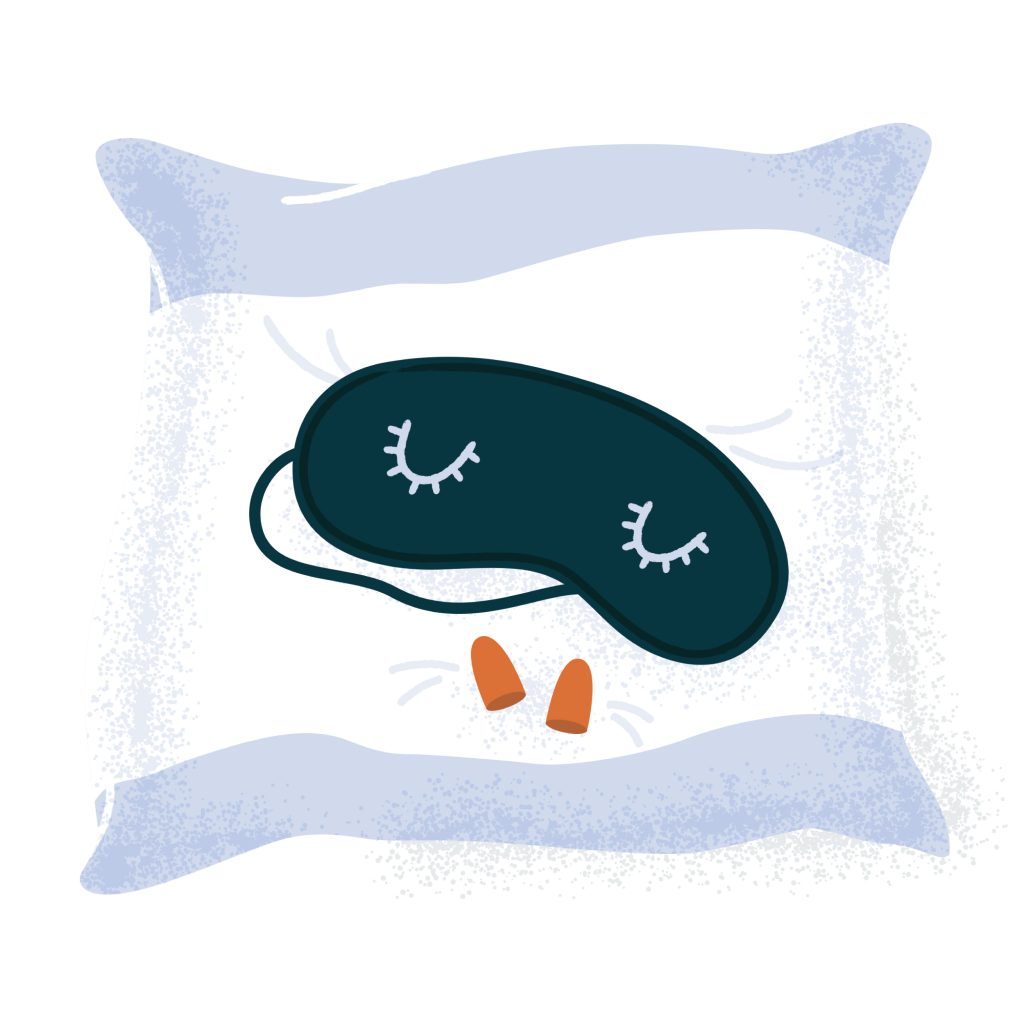
It might sound harsh, but it’s one way to put an end to the terror of night-time meowing: stay tough and don’t react! If your cat is standing in front of the door as usual, scratching and meowing, close your ears! Don’t respond to the meowing and don’t call out to them. Put yourself on mute! At first, the meowing and scratching will probably get louder. After that, however, even the pushiest of kitties will realise there’s no point anymore. Simply wear earplugs when you go to bed – and head off to dreamland.
Work off energy during the day

When asked about the secret to a long life, Sir Winston Churchill is said to have uttered the words “No sport!” There’s doubt about that remark – not just the claim itself, but whether the British Prime Minister made it in the first place – but the fact is that Churchill was a great cat lover! And anyone who’s truly fond of their feline should encourage them to exercise in a cat-friendly way. You can get lazy kitties to work off all their energy during the day, if you motivate them in the right way
Lots of love and affection during the day

Especially if your cat is alone and there’s no playmate of the same species available, they can quickly feel lonesome. To attract attention and get themselves noticed, cats develop a considerable repertoire of behaviours. Shared play and cuddling sessions are therefore important. After all, body and soul need to be cared for! And by the way, it’s good for you too, not just for your cat! Shared rituals can help to strengthen your relationship.
Leave your bedroom door open

Door open at night? If you don’t mind sharing your bed chamber with your cat, you can leave the door open and let them in. Many cats like to be close to their pack – that is, to you – at night, and they prefer to lie down where it’s nice, soft, warm and cosy, that is, in your bed! But if you let them do it once, your cat may want to come in every night… Do you really want that?
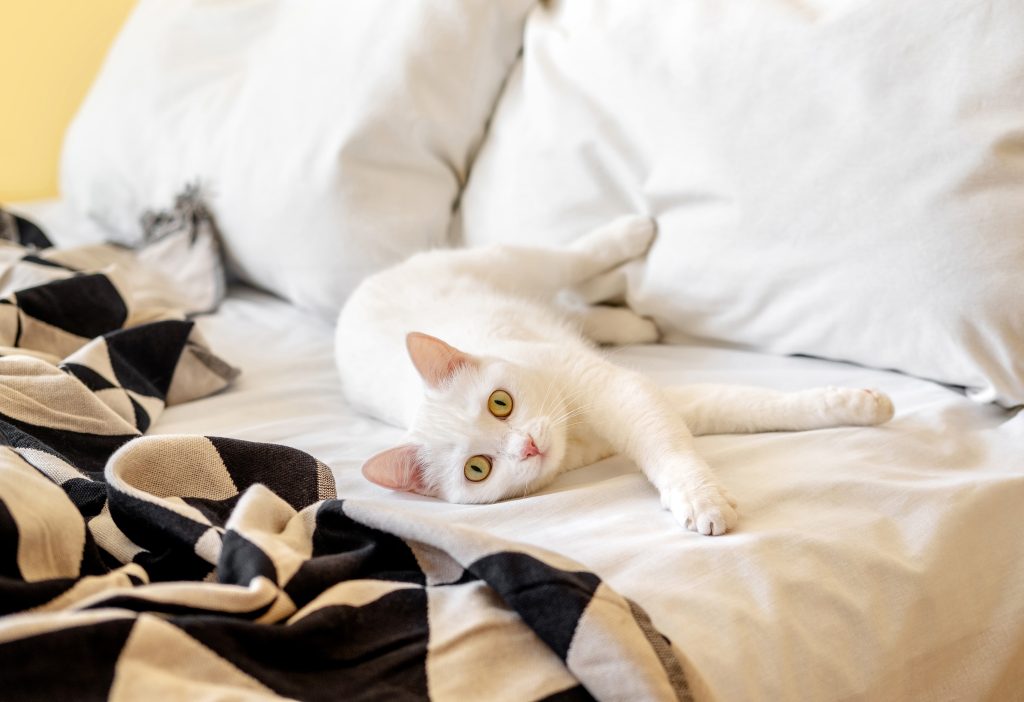
Get a second cat

Cats are sociable by nature. With this in mind, it’s best to get two cats right off the bat. Let’s face it; no human can fully replace another cat. No matter how hard you try, you’ll never be able to satisfy the need for closeness and entertainment like a fellow cat can. But that’s okay, you’re a human being, after all, and you don’t have to mutate into a cat just to get a good night’s sleep.
Cat howling at night – when should you take them to the vet?
When they reach the age of 7, cats slowly but surely start to age. Their senses diminish and this can unsettle many a furry friend. Their ability to see, hear and assess their surroundings like they used to diminishes and they become more cautious and affectionate – at night, too! If an older cat wants to be close to you, you should allow it. But if you get the sense that your cat is in pain or behaving differently than usual, you should take your cat to the vet, just to be on the safe side.
Sudden change in behaviour
Is your cat suddenly meowing a lot? Does their personality seem to have changed? Are they in their prime and have they always been easygoing when it comes to getting along with others? But now their behaviour has changed from one moment to the next, and all of a sudden they are
- fearful
- aggressive
- unclean
Or did they suddenly develop quirks: for example, are they constantly licking their fur or meowing incessantly – not only at night – for no apparent reason? Even if it’s not obvious to you, it’s very likely that your cat is dealing with some kind of problem. They’re not doing these things to annoy or provoke you, but because they’re lacking something or they don’t feel comfortable in their fur.
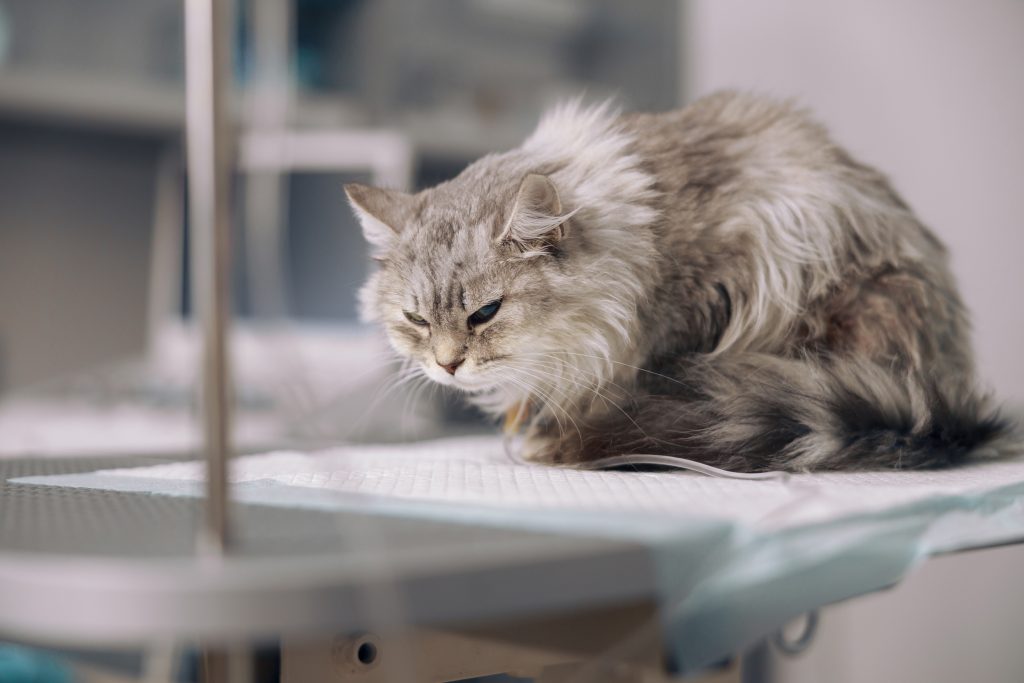
TIP: Every noticeable change in behaviour is a cry for help that you should take seriously!
When your cat won’t stop meowing at night
If you’re stuck and don’t know what to do, get professional help! This might be a vet or a cat psychologist. A vet can check whether there are any physical causes; as an “outsider”, their advice and perspective can work wonders. Many symptoms can even be treated quickly and easily. If the triggers lie deeper down in the cat’s consciousness, you might want to consult an animal psychologist who can suggest behavioural therapies and help you carry them out.
FAQs – Cat meowing at night
By meowing at night, your cat is seeking to alert you to certain physical or psychological needs: determine the cause and address it!
A cat’s body and soul need to be cared for, and they sometimes very loudly point this out to their caregivers.
An adult cat that meows at night wants you to be there for them. Depending on what kind of meowing their doing – energetic, whiny or in a whisper – you should react accordingly.
An adult cat that meows at night wants you to be there for them. Depending on what kind of meowing their doing – energetic, whiny or in a whisper – you should react accordingly.
Pay attention to the tone of the meowing: a cat with health problems will make pitiful sounds, meowing in woeful tones to make you come to their aid.
If you have the impression that something is wrong, you should always be on the safe side and take your cat to the vet.

